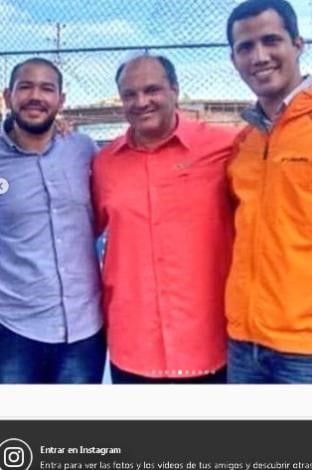
The regime of Nicolás Maduro, president of Venezuela, dealt a new blow to the interim president of the same country, Juan Guaido. According to Agenzia EFE, the ruling leader and president of the Venezuelan Parliament, Jorge Rodríguez, recently showed the press some evidence that would link Guaidó to an alleged drug trafficker who was arrested in Colombia, Biagio Benito Garofalo Forte.
It is important to remember that on March 13, the Italian-Venezuelan kingpin was captured on Colombian territory, who was wanted in 193 countries and since 2015 had a red circular from Interpol. Garofalo spent a vacation in Cartagena until they were interrupted by Migration Colombia, thanks to Interpol's alert to the presence of the character accused of trafficking drugs.
With that in mind, Jorge Rodríguez assured that both Guaido and opposition leader Leopoldo López, both members of the Popular Will party, would have ties to the drug trafficker.
The President of Parliament stated at a press conference that, “the relationship between this tragic adventure called Juan Guaidó and Colombian drug trafficking and Venezuelan drug trafficking and representatives of Venezuelan drug trafficking is clear, notorious, public, communicational and with evidence.” He also indicated at the event that “this Mr. Garofalo is the main financier of Popular Will,” he added.
The evidence revealed
Rodríguez showed as evidence an alleged letter of Popular Will, signed by Guaidó on January 16, 2016, in which he names Biagio Benito Garofalo Forte as “municipal coordinator” in the municipality of Anaco. The president of the regime's parliament indicated that with this position, “the Italian-Venezuelan drug trafficker exercised his influence for drug trafficking and lived.”
At the same time, he exhibited some photos in which Guaidó and members of Popular Will are identified next to Garofalo. The newspaper El Tiempo heard one of the images revealed by the President of Parliament in which the interim president is identified with the drug trafficker:

Among those mentioned by the President of Parliament is Marco Aurelio Quiñones, a deputy of the Venezuelan National Assembly, who expressed his disagreement with Rodríguez's statements. “The dictatorship singled out and rewarded for its captures due to links to drug trafficking, sets up an absurd novel to try to muddy our struggle,” the official wrote on his Twitter account.
Quiñones offered a series of arguments as to why what Rodriguez said would not make sense. First, he commented that, “the first thing the regime would have to respond to is as a person requested by Interpol since 2006, knowing where he lives, who he is and who he is meeting with, he was not captured for 16 years.”
Faced with the alleged document signed by Guaidó, the deputy asserted that, “in VP there are no municipal appointments with national appointments.” In this way, he pointed out that the alleged signed letter would be false, in addition to having “spelling errors (...) to know that you did it and not us,” he added.
On the other hand, Jorge Rodríguez also presented a video of a celebration in which the internal president is seen at the drug trafficker's house in January 2019. The clip was shared by @latablablog:
Faced with the allegations set out above, Juan Guaidó has not spoken out on the subject. Although Quiñones is emphatic in stating that this really has to do with an excuse from Chavismo not to resume the dialogue table with Mexico, which was stopped after the extradition of Alex Saab, accused of being Nicolás Maduro's front man, to the United States.
KEEP READING:
Últimas Noticias
Debanhi Escobar: they secured the motel where she was found lifeless in a cistern
Members of the Specialized Prosecutor's Office in Nuevo León secured the Nueva Castilla Motel as part of the investigations into the case

The oldest person in the world died at the age of 119
Kane Tanaka lived in Japan. She was born six months earlier than George Orwell, the same year that the Wright brothers first flew, and Marie Curie became the first woman to win a Nobel Prize

Macabre find in CDMX: they left a body bagged and tied in a taxi
The body was left in the back seats of the car. It was covered with black bags and tied with industrial tape
The eagles of America will face Manchester City in a duel of legends. Here are the details
The top Mexican football champion will play a match with Pep Guardiola's squad in the Lone Star Cup

Why is it good to bring dogs out to know the world when they are puppies
A so-called protection against the spread of diseases threatens the integral development of dogs



